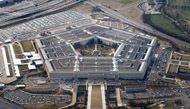3 U.S. Defeats: Vietnam, Iraq and Now Iran
▶ David Brooks
Over the course of this siege, U.S. policymakers have been very explicit about their goals. Foremost, to prevent Iran from becoming a nuclear power. Second, as John Kerry has said, to force it to dismantle a large part of its nuclear infrastructure. Third, to take away its power to enrich uranium.
Fourth, as President Obama has said, to close the Fordo enrichment facility. Fifth, as the chief U.S. negotiator, Wendy Sherman, recently testified, to force Iran to come clean on all past nuclear activities by the Iranian military. Sixth, to shut down Iran’s ballistic missile program. Seventh, to have “anywhere, anytime 24/7” access to any nuclear facilities Iran retains. Eighth, as Kerry put it, to not phase down sanctions until after Iran ends its nuclear bomb-making capabilities.
As a report from the Foreign Policy Initiative exhaustively details, the U.S. has not fully achieved any of these objectives. The agreement delays but does not end Iran’s nuclear program. It legitimizes Iran’s status as a nuclear state. Iran will mothball some of its centrifuges, but it will not dismantle or close any of its nuclear facilities. Nuclear research and development will continue.
Iran wins the right to enrich uranium. The agreement does not include “anywhere, anytime” inspections; some inspections would require a 24-day waiting period, giving the Iranians plenty of time to clean things up. After eight years, all restrictions on ballistic missiles are lifted. Sanctions are lifted once Iran has taken its initial actions.
Wars, military or economic, are measured by whether you achieved your stated objectives. By this standard the U.S. and its allies lost the war against Iran, but we were able to negotiate terms that gave only our partial surrender, which forces Iran to at least delay its victory. There have now been three big U.S. strategic defeats over the past several decades: Vietnam, Iraq and now Iran.
The big question is, Why did we lose? Why did the powers of the Western world lose to a regime with a crippled economy and without much popular support?The first big answer is that the Iranians just wanted victory more than we did. They were willing to withstand the kind of punishment we were prepared to mete out.
Further, the Iranians were confident in their power, while the Obama administration emphasized the limits of America’s ability to influence other nations. It’s striking how little Obama thought of the tools at his disposal. He effectively took the military option off the table. He didn’t believe much in economic sanctions.
The president concluded early on that Iran would simply not budge on fundamental things. As he argued in his highhanded speech Wednesday, Iran was never going to compromise its sovereignty (which is the whole point of military or economic warfare).
The president hoped that a deal would change the moral nature of the regime, so he had extra incentive to reach a deal. And the Western, Russian and Chinese sanctions regime was fragile while the Iranians were able to hang together.
This administration has given us a choice between two terrible options: accept the partial-surrender agreement that was negotiated or reject it and slide immediately into what is in effect our total surrender — a collapsed sanctions regime and a booming Iranian nuclear program.
Many members of Congress will be tempted to accept the terms of our partial surrender as the least bad option. But in voting for this deal, they may be affixing their names to an arrangement that will increase the chance of comprehensive war down the road.
Iran is a fanatical, hegemonic, hate-filled regime. If you think its radicalism is going to be softened by a few global trade opportunities, you really haven’t been paying attention to the Middle East over the past four decades.
Iran will use its $150 billion windfall to spread terror around the region and exert its power. It will incrementally but dangerously cheat on the accord. Armed with money, ballistic weapons and an eventual nuclear breakout, it will become more aggressive. As the end of the nuclear delay comes into view, next presidents will decide that action must be taken.
Economic and political defeats can be as bad as military ones. Sometimes when you surrender to a tyranny you lay the groundwork for a more cataclysmic conflict.
스마터리빙
more [ 건강]
[ 건강]이제 혈관 건강도 챙기자!
[현대해운]우리 눈에 보이지 않기 때문에 혈관 건강을 챙기는 것은 결코 쉽지 않은데요. 여러분은 혈관 건강을 유지하기 위해 어떤 노력을 하시나요?
 [ 건강]
[ 건강]내 몸이 건강해지는 과일궁합
 [ 라이프]
[ 라이프]벌레야 물럿거라! 천연 해충제 만들기
 [ 건강]
[ 건강]혈압 낮추는데 좋은 식품
[현대해운]혈관 건강은 주로 노화가 진행되면서 지켜야 할 문제라고 인식되어 왔습니다. 최근 생활 패턴과 식생활의 변화로 혈관의 노화 진행이 빨라지고
사람·사람들
more
[한인단체 신년 인터뷰] LA 평통 장병우 회장… “본연 역할로 한반도 평화 실질 기여”
민주평화통일자문회의 LA협의회(이하 LA 평통) 장병우 회장은 6일 본보와의 신년 인터뷰에서 붉은 말의 해인 병오년 새해를 맞아 신년 화두로 …

워싱턴주에 첫 한인 시의장
워싱턴주에서 첫 한인 시의회 의장이 탄생했다. 제이슨 문(한국명 문태원) 머킬티오 시의원이 새해 들어 시의장으로 선출되며 또 하나의 중책을 맡…
국회 방문단 대한인국민회 방문
윤후덕·이해식·김한규 의원과 조오섭 국회의장 비서실장 등 10여 명의 한국 국회방문단이 지난 5일 LA를 찾아 로즈데일 묘지와 국민회관 등 미…
[한인단체 신년 인터뷰] 명원식 파바월드 회장… …
“한인 차세대들이 바르게 자랄 수 있는 토대를 만드는 것이 제가 파바월드의 회장으로 존재하는 유일한 이유입니다”한인사회의 대표적 청소년 봉사 …
LA한인회 멘토 프로그램 10일 스티브 강 위원장
LA 한인회(회장 로버트 안)가 한인사회 차세대 인재양성 노력의 하나로 ‘멘토를 만나다’ 프로그램을 정례화해 실시하고 있는 가운데 그 세 번째…
많이 본 기사
- ICE 요원 총격… 시민권자 여성 사망 ‘발칵’
- 초강경 이민단속, 아시아계도 큰 타격
- 케빈 김 주한 미 대사대리 전격 이임
- 이주자 텍사스 몰린다 가주는 유입자 최하위
- ‘故안재환과 사별’ 정선희, 재혼 질문에 솔직 답변 “국내에선 의향 없어”
- 가주 등 5개주 연방 아동보육 예산 전격 동결
- 42억 횡령→징역형 집유 받았는데도..황정음 소속사 여전히 미등록
- 41세 구혜선, 석사 논문 합격→조기졸업.. “다음은 박사 필승!”
- 치매 예방효과 탁월한 활동은 ‘춤’…… 1
- 故안성기, 9일(한국시간) 영결식..영정 정우성→설경구·주지훈 운구
- 뉴욕시 ‘숨은 수수료’ 퇴출 나섰다 1
- [독자 투고] 땅 끝 마을 파타고니아 여행 유감
- 경관이 항공기내 성추행 LA행서 신체노출 ‘유죄’
- 목·어깨·팔이 갑자기 찌릿하다면?… ‘근막동통증후군’ 일수도
- 니콜 키드먼, 키스 어번과 공식 이혼
- “그린란드에 미군 동원 가능”… 트럼프 야욕 드러내
- ‘맥립’에 갈비고기 없다 맥도널드 허위광고 소송
- LAX 무인열차 6월엔 개통되나
- 당뇨병 환자 발 절단하면 사망률 암보다 높아
- 올해 내 집 마련하려면… 철저한 대출 상품 비교부터
- 오렌지 상자와 함께하는 2026년
- 다운 사이징), 작은 집이 주는 큰 자유!!
- [신년 집중기획/ 변모하는 한인타운] K-컬처 중심으로… 면모·체질 ‘업그레이드’ 원년
- [전문가 칼럼] 디지털 시대, 노년의 뇌를 지키는 방법
- 사면된 의회 폭동범들 ‘적반하장’… 금전보상 요구까지
- 아시아나항공, 14일부터 인천공항 제2터미널 사용
- 연말연시 음주운전 단속 379명 체포
- “베네수 원유 수천만배럴 미국에 인도”
- [오세정 칼럼] 병오년 새해, 한국의 과제
- 컴퓨터 전공·로스쿨 졸업생들도‘취업난’극심
- ‘마구잡이 이민단속’ 제한 법안 속속 진전
- 尹 ‘내란 우두머리’ 재판 내일 종료…사형? 무기징역? 구형 주목
- LA 한인회, 새해 맞아 양로병원 어르신들께 ‘새배’
- 방탄소년단 ‘봄날’ 멜론 연간차트 9년째 롱런 위엄
- 학교 총기난사범 석방 가능성 논란
- 제임스+돈치치 ‘쌍포 60점 폭발’… 레이커스 3연승 행진
- 관세재판 패소 시 환급금 1,400억달러
- [제일녹용건재상사] “고품질 약재로 병오년 최고 건강 선사”
- “마두로 체포 환영하는 시민 잡아라”…휴대폰 뒤지고 불심검문도
- 트럼프, 각세우던 콜롬비아 대통령과 돌연 통화…백악관 초청도
- [윌셔에서] 레디 코어(Ready Core)의 해를 맞으며
- VA 재무차관에 한인 제임스 허
- [대형 산불 1주년 현황] LA 산불 재건축 3분의 1 불과… 주민들 ‘고통’
- FT가 본 2026년 전망… “트럼프 관세정책 완화”
- 은퇴준비를 더 이상 미루면 안되는 이유
- 올해 새해 결심은 ‘주택 관리’… 방치하면 더 큰 수리로
- “기관투자자 단독주택 매입금지 추진”
- [지평선] 67년생 현역 축구선수 미우라
- 고교생 대상 ‘유망주 클리닉’ 나선 MLB 이정후
- ‘콜록콜록’ …워싱턴 독감환자 폭증
1/5지식톡

-
 미 육군 사관학교 West Poin…
0
미 육군 사관학교 West Poin…
0https://youtu.be/SxD8cEhNV6Q연락처:wpkapca@gmail.comJohn Choi: 714-716-6414West Point 합격증을 받으셨나요?미 육군사관학교 West Point 학부모 모…
-
 ☝️해외에서도 가능한 한국어 선생님…
0
☝️해외에서도 가능한 한국어 선생님…
0이 영상 하나면 충분합니다!♥️상담신청문의♥️☝️ 문의 폭주로 '선착순 상담'만 진행합니다.☎️ : 02-6213-9094✨카카오톡ID : @GOODEDU77 (@골뱅이 꼭 붙여주셔야합니다…
-
 테슬라 자동차 시트커버 장착
0
테슬라 자동차 시트커버 장착
0테슬라 시트커버, 사놓고 아직 못 씌우셨죠?장착이 생각보다 쉽지 않습니다.20년 경력 전문가에게 맡기세요 — 깔끔하고 딱 맞게 장착해드립니다!장착비용:앞좌석: $40뒷좌석: $60앞·뒷좌석 …
-
 식당용 부탄가스
0
식당용 부탄가스
0식당용 부탄가스 홀세일 합니다 로스앤젤레스 다운타운 픽업 가능 안녕 하세요?강아지 & 고양이 모든 애완동물 / 반려동물 식품 & 모든 애완동물/반려동물 관련 제품들 전문적으로 홀세일/취급하는 회사 입니다 100% …
-
 ACSL 국제 컴퓨터 과학 대회, …
0
ACSL 국제 컴퓨터 과학 대회, …
0웹사이트 : www.eduspot.co.kr 카카오톡 상담하기 : https://pf.kakao.com/_BEQWxb블로그 : https://blog.naver.com/eduspotmain안녕하세요, 에듀스팟입니다…
케이타운 1번가
오피니언
 이상희 UC 리버사이드 교수 인류학
이상희 UC 리버사이드 교수 인류학 오렌지 상자와 함께하는 2026년
 오세정 서울대 물리천문학부 명예교수·전 총장
오세정 서울대 물리천문학부 명예교수·전 총장 [오세정 칼럼] 병오년 새해, 한국의 과제
 존 안 / LA 거주
존 안 / LA 거주 [독자 투고] 땅 끝 마을 파타고니아 여행 유감
 이리나 수필가
이리나 수필가 [윌셔에서] 레디 코어(Ready Core)의 해를 맞으며
 이영창 / 한국일보 논설위원
이영창 / 한국일보 논설위원 [지평선] 67년생 현역 축구선수 미우라

[왈가 왈부] “이혜훈 청문회까지 지켜봐야”… 국민 눈높이에 맞나요
 정숙희 논설위원
정숙희 논설위원케네디에 관한 네 개의 이야기
 마크 A. 시쎈 / 워싱턴포스트 칼럼니스트
마크 A. 시쎈 / 워싱턴포스트 칼럼니스트 [마크 A. 시쎈 칼럼] 트럼프의 20가지 업적
 김동찬 시민참여센터 대표
김동찬 시민참여센터 대표 [미국은 지금] 2026년 ‘손님’ 의식 버리고 ‘주인’ 입장을
1/3지사별 뉴스

뉴욕시 ‘숨은 수수료’ 퇴출 나섰다
뉴욕시가 일반 소비 시장에 만연해 있는 ‘숨은 수수료’(Junk fee) 근절에 나섰다. 조란 맘다니 뉴욕시장은 5일 ‘숨은 수수료’ 및 ‘…
‘마구잡이 이민단속’ 제한 법안 속속 진전

VA 재무차관에 한인 제임스 허
30대 중반의 한인 제임스 허 씨(사진)가 버지니아 재무차관(Deputy Secretary of Finance)에 내정됐다. 아비가일 스팬버거…
‘콜록콜록’ …워싱턴 독감환자 폭증

베네수 이어 그린란드…트럼프, 2년차 벽두부터 美우선주의 거친 질주
2026년 새해 벽두부터 도널드 트럼프 대통령의 행보가 심상치 않다.집권 2기 2년차를 맞아 자신과 지지층의 이념이라 할 ‘미국 우선주의’ 구…
중부 캘리포니아 ‘한인 이민사’ 나왔다

오늘 하루 이 창 열지 않음 닫기 


















































.png)


댓글 안에 당신의 성숙함도 담아 주세요.
'오늘의 한마디'는 기사에 대하여 자신의 생각을 말하고 남의 생각을 들으며 서로 다양한 의견을 나누는 공간입니다. 그러나 간혹 불건전한 내용을 올리시는 분들이 계셔서 건전한 인터넷문화 정착을 위해 아래와 같은 운영원칙을 적용합니다.
자체 모니터링을 통해 아래에 해당하는 내용이 포함된 댓글이 발견되면 예고없이 삭제 조치를 하겠습니다.
불건전한 댓글을 올리거나, 이름에 비속어 및 상대방의 불쾌감을 주는 단어를 사용, 유명인 또는 특정 일반인을 사칭하는 경우 이용에 대한 차단 제재를 받을 수 있습니다. 차단될 경우, 일주일간 댓글을 달수 없게 됩니다.
명예훼손, 개인정보 유출, 욕설 등 법률에 위반되는 댓글은 관계 법령에 의거 민형사상 처벌을 받을 수 있으니 이용에 주의를 부탁드립니다.
Close
x